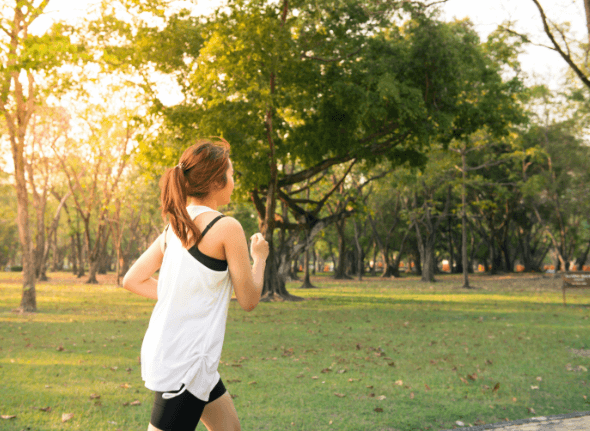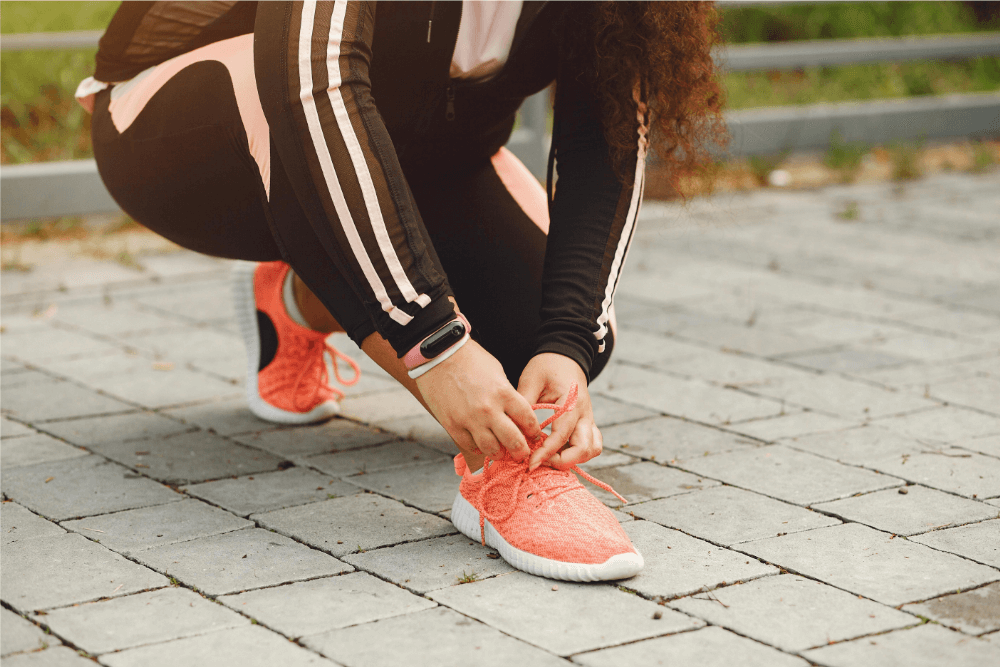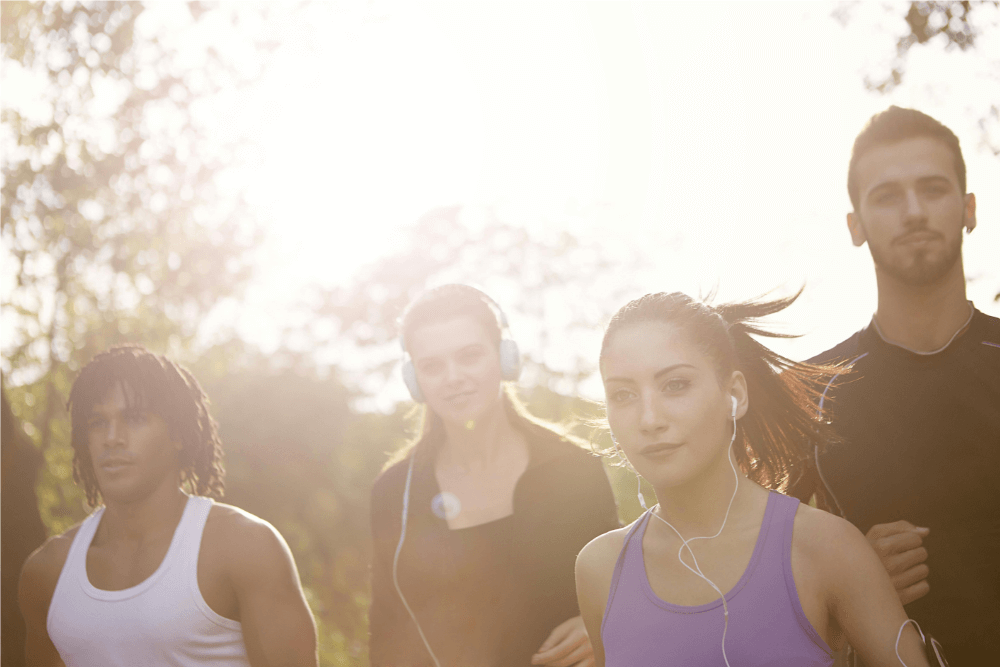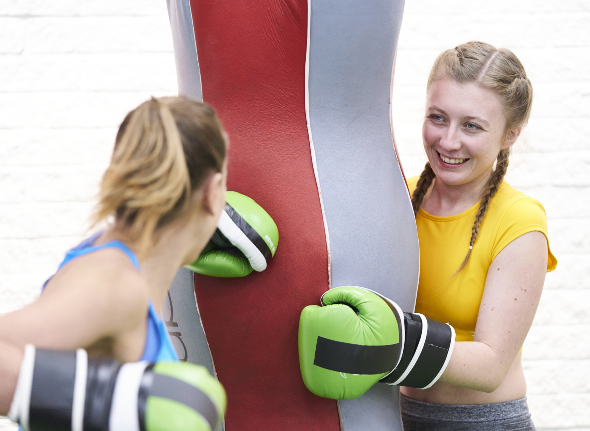How to start running for the first time
Physically, running is very simple. It’s one foot in front of the other, swing your arms back and forth, hold your head up (and try not to trip over your own feet!). This article will explore how we can all get starting with our running journey.


Benefits of Running
There are many benefits to running which are both physical and mental.
Let’s break down a few of our favourites:
Getting Outdoors
Running is a great way to spend more time outdoors and take in some fresh air.
I’d recommend planning your routes before you head out and stick to well-lit, popular running paths or tracks in your local area.
Local parks are a great place to start, just make sure if you’re running there you wear bright colours or reflective running vests in the early morning or evening so traffic can see you.
Improve Physical Health
Running regularly can reduce your risk of catching and developing illnesses whilst strengthening your muscles and bone density. This helps to keep your body fit and healthy.
Better Mental Health
Running also has mental benefits which help to reduce stress and anxiety levels. It can also make you feel great due to the hormones your body releases when exercising. Go get those endorphins!
What Equipment Do I Need?
Luckily, running is one of the cheapest sports you can take up. The fundamental pieces of equipment include:
Running Shoes
- Skip the Converse, you’ll need to ensure you have a good pair of supportive running trainers so you can avoid injury. This is the most important piece of equipment you’ll need. A supportive pair of running shoes will make sure you stay comfy, happy, and avoid the dreaded running blisters!
Breathable clothing
- You’ll need some breathable clothing to help you stay cool and comfortable. Typically, the runner’s rule is to dress as though it’s 5’c hotter than the temperature outside as your body will warm up once you get moving.
- Make sure your clothes are flexible (like shorts, leggings, and supportive sports bras) so they don’t restrict your movement.

“Be kind to yourselves, listen to your body and give it go. You might be surprised by how much you enjoy it!”
What services are available in my area?
Park Run
If you’ve been up and about on a Saturday morning, you may have already bumped into large groups of runners taking part in your local Park Run. Park Run is a free community event for people of all ages and abilities to join a 5k and 2k runs in parks across the UK and the world.
You can run, jog, walk the course however you want, or spectate if you’d rather watch and encourage others. There are also opportunites to volunteer to help run the events if you would like to be involved.
The event isn’t a race, so you don’t need to worry about where you finish. All you need to do is register for free on the Park Run website and enjoy the event. There’s an interactive map on the website so you can view which Park Runs are nearest to you.
All Park Runs start at 9am on Saturday morning (5k). All Junior Park Runs start at 9am on Sunday morning (2k). Junior Park Runs are for children aged 4 – 14.
Running Clubs
Joining a local running club is a fantastic way to start your running journey and benefit from the support and wisdom of more experienced runners. Running clubs are supportive, friendly places, which help new runners develop their confidence and ability.
They’re a great way to meet new friends, and many clubs offer Couch to 5k programmes, junior running groups, and mental health support services for free. Make sure you contact the running club first to check which services they offer, as some will require a payment for yearly membership whilst others don’t.
What programmes can I access?
It can often feel overwhelming to know where to start with running, but there’s some great resources to help get you started:
Couch to 5k
Couch to 5k is a free online running plan which is offered by the NHS. It’s designed for absolute beginners and helps people to gradually work their way up to running a 5k distance and generally be more active. You can access and download the app and podcasts through the NHS website.
McrActive
For those looking to progress or follow a structured training plan, Mcr Active’s website provides a search function which allows you to discover running groups, sessions, or clubs in Manchester. Check out your local council’s website to find other activities near you.

Top Tips
- Always remember to warm up before each run with light exercise to get your body warm and your heart rate increasing! This can include marching on the spot, a brisk walk, jogging, skipping etc
- Walking and stretching after your run are good ways to cool down whilst reducing your heart rate. Try simple stretches which focus on areas such as the quads, hamstrings, and glutes.
- Remember to drink water! Hydration is key to avoiding cramps and helping your body recover after the run.
I always remember my dad (an experienced runner) telling me during my teenage years that the hardest part about running is getting out of the door and the greatest achievement of any race is making it to the start line.
As I’ve grown up, I’ve learned this is very true. Not every run is going to be easy. It’s okay to slow down, stop, take in the view, and appreciate what your body can do – and how far you’ve come on your journey!
Related

I want some ideas to get moving!
[rt_reading_time...

What is vaping and how can it affect me?
[rt_reading_time...
